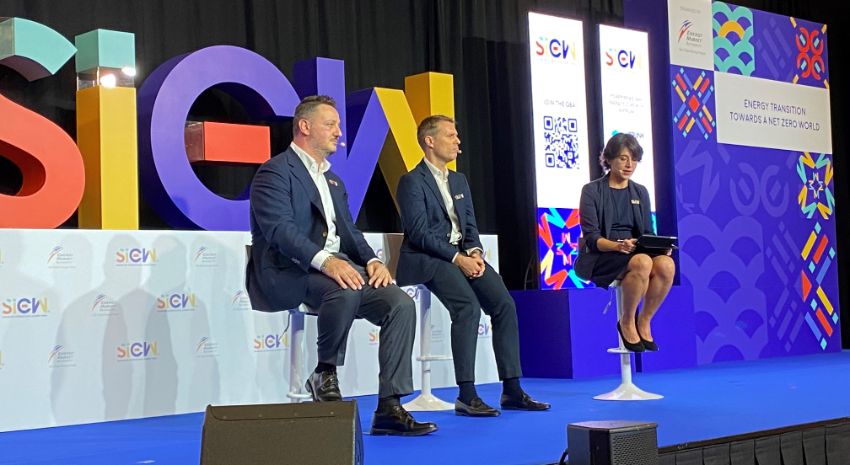AirTrunk report explores the path to 24/7 clean energy in APAC: Challenges, Aspirations, and Calls-to-Action. Anthony Cebokli, Associate, Infrastructure Advisory - Deal Advisory, KPMG Services Pte Ltd Singapore, reports. This article is contributed by KPMG - the official Content Partner for SIEW 2023.

In this session, the focus shifts to the prospects and challenges of adopting a 24/7 renewable energy approach in the Asia-Pacific region. The critical role of data in decision-making, as well as the unique policy solutions required for each country in enabling clean electricity procurement, was emphasised.
Charting the path to 100% renewable energy in data centres
Joscha Schmitz, Head of Energy & Climate for Asia Pacific & Japan Hyperscale Data Centre Specialist, AirTrunk, mentioned that there's substantial room for growth in renewable energy penetration and cost-effectiveness. Challenges include the availability of hourly matching of products, and commercial breaks, though the market is evolving. Hourly matching is crucial for data centers due to their flat energy profile, relying on stable, clean power. With growing energy consumption and competing demands from electrification, green hydrogen, and electric vehicles, the sector aims for full power sector decarbonisation, making 24/7 clean energy the ultimate goal. Collaborative planning is vital for a cost-effective transition.
"It's imperative that we develop sustainable solutions and ensure a substantial supply of clean energy. In this context, 24/7 energy is our ultimate goal, marking the path towards full power sector decarbonisation," said Mr Schmitz.
Policy, technology, and investment pathways
Giorgio Fortunato, Head of APAC Data Center Energy, Google, indicated that Mr Schmitz’s insights align with the goals of advancing decarbonisation and ensuring incentives genuinely promote green energy. It's not sufficient for data centers to rely on renewables while fossil fuels still dominate the grid.
Taking a broader perspective, Mr Fortunato mentioned policy plays a pivotal role in enabling interconnection, access to power purchase agreements, and technology deployment. A diverse range of carbon-free technologies is essential for accelerating decarbonisation, and substantial investments, exemplified by Google's commitment, are crucial. Moreover, technology retirement, expanded competitive wholesale electricity markets, and universal access to renewable energy are vital components of this transition.
"We need an inclusive mix of technologies and a portfolio to accelerate decarbonisation. Investment is key. For instance, Google has invested $29 billion in renewable energy technologies since 2010, with a projection of $200 billion by 2040," Shared Mr Fortunato.
Insights and imperatives
Mr Fortunato and Rena Kuwahata, Energy Analyst at International Energy Agency, both emphasised that the ultimate goal of achieving higher granularity accounting is closely tied to the diverse electricity market structures in the Asia-Pacific region. The discussion underscored the importance of policy solutions to enable clean electricity procurement and ensure effective system integration.
Ms Kuwahata highlighted the need for improved data access to level the playing field. Key breakthroughs for realising a 24/7 renewable energy approach in the next decade include enhancing interconnection between countries and connecting distant renewable resources to consumption centres. She also stressed the role of policymakers and regulators in enabling various procurement approaches and the crucial involvement of data centers and tech companies. Structured frameworks are needed for effective data utilisation, and the key takeaway is the importance of concerted efforts in paving a smoother path towards energy transition in the region.
‘’Policymakers and regulators must actively support diverse procurement approaches to attract private investment for future energy needs,’’ said Ms Kuwahata.
This session stresses the urgency of Asia-Pacific's transition towards a renewable energy future and the essential role of policymakers, data, technology, and investment. To realise the 24/7 approach, fostering interconnection, investing in a variety of carbon-free technologies, and ensuring access for consumers to procure renewable energy are crucial. This transition not only enhances regional sustainability but aligns with the global shift towards a net zero world, emphasising the importance of a collective effort in forging a cleaner and sustainable energy future.
Follow us for more timely updates on X (formerly Twitter) and Telegram.